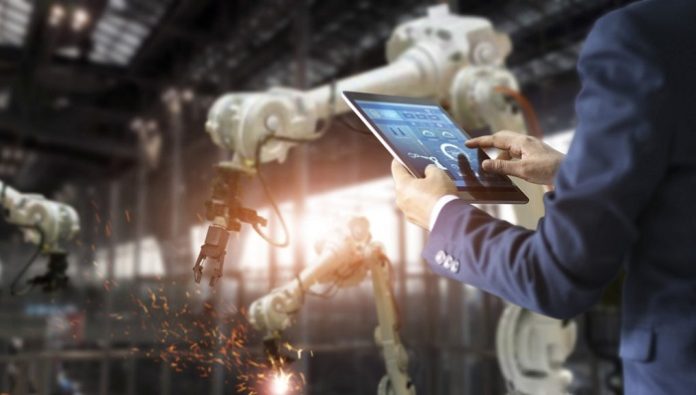Smart Factory, Industry 4.0, factory automation, IIoT are among the key drivers of enabling factories and manufacturing space to react and adapt to the next technological revolution which is more efficient than the legacy methods. Artificial intelligence and machine learning are becoming inseparable elements of the new smart factory ecosystem.
For a deeper understanding of the smart factory landscape, ELE Times Sub Editor and Technology Correspondent Mayank Vashisht had an insightful conversation with an industry expert, Sekar Udayamurthy, Co-founder and CEO of Jidoka Tech.
Jidoka Technologies, a new-age start-up, delivering cutting edge engineering solutions. It specialises in automating cognitive inspection of visual defects in manufacturing by leveraging Deep Learning, AI/ML and Analytics. Jidoka works with manufacturers across automotive, pharma, general manufacturing, electronics, textiles and printing industrial domains currently and will expand to other verticals in future.
Understanding the need to automate and fine-tune the QC process, Jidoka built a state-of-the-art automated cognitive QC solution that delivers 98% or higher accuracy in the QC process and a significant increase in throughput. It combines the power of AI with automation to enhance the quality and efficiency of QC in the manufacturing process.
Excerpts:

ELE Times: The transition from conventional factory setups to smart factories can be considered as one of the major tectonic shifts in the way a factory operates. How much do you agree with this statement and what evidences would you give to support your answer?
I am in complete agreement with this statement. This shift will redefine the way manufacturing is done in the country – the range of products we will be able to make now, the quality of our products, and more importantly the way we work.
Traditional or conventional factory setup predominantly includes legacy systems or machinery, manual processes and isolated operations. Such a set-up is time-consuming with no data backup leading to frequent machine failures and increases in maintenance costs. Productivity is low due to the setting in of the fatigue factor among the shop floor workforce and the lack of integration between different systems and tools. There is less room for improvement as the deployment of technology is low. Delayed go-to-market strategy and reduction in revenues are common. Decision making is rather slow as they are not based on data insights.
The Smart factory ecosystem – a paradigm shift really – leverages digital transformation with new-age technology and tools, as it slowly replaces the conventional setup.
Centralised data accessibility, integrated operations and optimal machine utilisation, along with data-based, faster decision-making capabilities, integrated operations, reduced maintenance costs and accelerated productivity are some of the things that can be further accelerated with 5G technology. By leveraging smart technologies, the new-age factories can witness 100% transparency and visibility in the operations with a significant increase in throughput of higher quality products with the deployment of 100% inspection.
Also, Data produced can be used for further improvisation and better performance of the entire operations. Protection of workers’ health and safety, facilitating lesser human contact and ensuring production lines run 24X7, are made possible with smart technologies.
With all this in place, we as a nation will be at par with some of the best manufacturing hubs in the world – giving the economy a much-needed boost.
ELE Times: In what ways the incorporation of next-gen technologies like AI, ML, and IoT in smart factories are helping industries to reach a greater and more efficient level of autonomy in operations?
A host of benefits are observed when manufacturing companies adopt technologies, such as AI, Machine Learning, Deep Learning, IoT, Big Data Analytics, Cloud Manufacturing, Robotics, Augmented Reality among others. Quality of products and throughput dramatically increases and can be very advantageous for goods that are in high demand. Operation processes get streamlined, leading to an increase in efficiency and productivity. Organisations who have adopted these have seen significant reductions in costs, an increase in customer satisfaction and better business outcomes. Add to this, higher flexibility, scalability, reduction in error due to automated visual inspection, lesser wastage and elimination in downtime. When the industrial safety management system is additionally integrated, it eliminates shop floor accidents too.
Deep Learning, a subset of Machine Learning in AI is leveraged to teach machines to learn by example. This technology can recognise features that distinguish trends and make intelligent predictions and decisions. It also scales the intelligence of human visual inspection with the reliability, consistency and speed of a computerised system.
AI and Robots, help to address the shortage of workers, restart manufacturing operations post-pandemic and ensure a sharp increase in productivity. AI and ML-driven automation can detect even minor defects of products and processes on a continual basis without the presence of manpower. Robots can be trained to perform repetitive tasks in production environments. These technologies can improve efficiency, reduce downtime significantly.
Shop-floor performance can be captured on dashboards with IoT and along with Big Data Analytics, it can help gain insights for better performance and forecast demand, adding to the efficiency of operations. Networking of machines on the shop-floor is supported by the Industrial Internet of Things (IIoT) that helps in data collection, which is very crucial for predictive analytics that increases the efficiency of the systems even further.
ELE Times: What are the Tangible benefits of using Jidoka solution?
Jidoka’s state-of-the-art solution combines the power of Artificial Intelligence (AI) with automation and computer vision to deliver 98% or higher accuracy in the Quality Control (QC) process. It also enables 100% visual inspection/defect detection, thus supports to avoid backlogs and bottlenecks with its 24X7 deployment. Some of our customers have seen a 10% increase in yield.
The solution helps in enhancing the quality inspection process without human biases, which eliminates the issue of good parts getting rejected leading to a 30 to 40% reduction in false rejections. In the Quality Assurance process, Corrective and Prevention Actions (CAPA) can be implemented to eliminate non-conformities with effective analysis – in other words, increased savings.
With an exponential increase in the ability to detect defects accurately, better products can be shipped out, leading to higher levels of customer satisfaction and ensured repeat business. Also, with a 20% increase in speed of inspection QC bottlenecks get eliminated and our clients have seen up to a 33% increase in throughput is seen – more earnings.
So robust and effective is our solution that we have seen a realisation of the ROI in the Jidoka system in as less as 12-15 months.
ELE Times: What are the latest technology trends in smart manufacturing?
In the new normal, the manufacturing industry like many others will accelerate its digital transformation efforts, at a must higher rate than it did in the pre-pandemic phase.
An increase in adoption of Big Data and Analytics in addition to IoT scaling will be seen for efficient manufacturing operations, as there is a great need to access current data which is accurate as well. Enterprise IoT that is used to connect facilities on the shop floor, workplaces and beyond will increase for better visibility, monitoring and optimising operations.
Predictive maintenance – very critical for the delivery of excellence in operations – will support preventive, unplanned disruptions or failures. It will also optimise operational costs, extend the lifespan of the equipment and eliminate waste, among other benefits. Operating models will become more flexible thereby improving the assembly line performance.
As already mentioned, Industrial Robots will work together with humans to complete complicated tasks. AI/ML and Deep Learning technologies will help in Quality Inspection processes.
With the demand for faster responses to situations, processing of data will be done nearer to where it is created, hence more emphasis will be on Edge Computing as it will add to the agility, which is the need of the hour.
ELE Times: Is smart manufacturing and industrial automation a threat to Human resource? Please elaborate
On the contrary, smart manufacturing has actually come to the rescue of the sector especially during the onset of the recent pandemic. Shortage of manpower brought about an abrupt halt across the supply chain and some manufacturing units were even shut down and production was hampered to a large extent. It was the adoption of the new-age technologies such as AI and Robots or smart manufacturing processes that helped to restart business operations again. Furthermore, the China + 1 policy is creating new demands for Indian goods compelling manufacturers to look at smart manufacturing options beyond just manpower additions, to be able to cater to the export demand.
Smart manufacturing with its automation and leveraging of digital technologies is very beneficial to manufacturers, with the processes increasing the throughput, improving product quality and reducing production costs. These factors are also enhancing customer experiences and driving higher revenues for organisations. Automation is also arresting issues related to the health and safety of workers too.
It is a common myth that jobs on the shop floor will get replaced by automation. What really happens is that workers now have the ability to upgrade themselves to doing more intelligent work, in better conditions. Mundane and repetitive tasks are taken over by automation. Manufacturing and industrial automation has actually created new jobs – skilled in the areas of AI, Cloud Computing and Robotics and other new-age technologies to manage the new machines and automation. With up-skilling and re-training of the workforce, these jobs can make employees future-ready with intellectually stimulating and creative roles leading to better employee satisfaction.
Mayank Vashisht | Sub Editor | ELE Times

